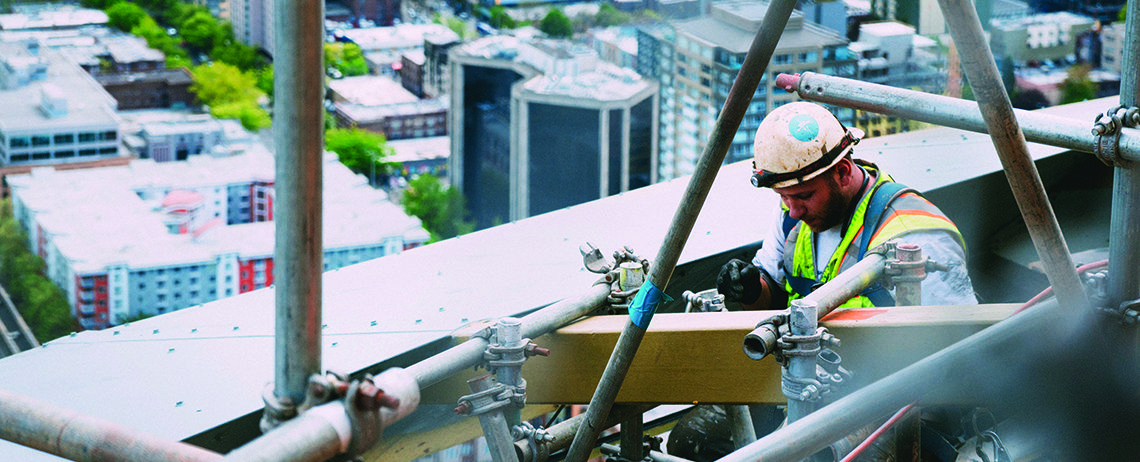Communication Key to Boosting Wellbeing in the Construction Industry
SafetyCulture News | By | 18 Oct 2018 | 3 minute read

Listening could be all it takes to improve the wellbeing of construction workers.
New research by academics from RMIT, the University of Cape Town and the University of Manchester found that communication, or lack of it, was a major factor in causes of stress for employees.
Workers felt they had a dearth of control, input and influence in their roles and that impacted their sense of purposeful and motivation, the report assessed.
The study found that lack of feedback on performance was a bigger issue for employees in construction compared with the general workforce and said people need constructive feedback to function well in their jobs.
It also reported not having ideas or suggestions taken into account was an issue affecting construction workers more than the norm, impacting their sense of control and empowerment.
Working conditions were also a problem. Issues including excessive travel time (44 per cent of respondents spent two to three hours a day travelling to and from work), an overload of technology, unrealistic deadlines, and isolation or lack of social support at work all came up.
The research was done for Britain’s Chartered Institute of Building as an update on a 2006 report on occupational stress in construction. Nearly 800 people were questioned. Respondents were asked about six “essential” areas that contributed to an overall picture of well-being: resources and communication, control, balanced workload, job security and change, work relationships and job conditions.
In the report, CIOB president Rebecca Thompson said there were more suicides among construction workers than any other profession, with employees 63 per cent more likely to die by suicide than the national average.
“Until recently, it appears that the industry has not treated mental health with much urgency,” she said. “Compared with the laudable zero harm culture that is now commonplace on site, there has been a marked contrast in the attention paid to well-being.
“It is clear from the report that construction does have a unique set of conditions compared to other sectors, but that the problems are not insurmountable. Looking to the future, if we want to attract the brightest and best young people to our sector as well as encourage experienced professionals to stay, having an industry that cares and provides conditions for its employees to thrive is absolutely vital.”
The report says construction workers operate in a relatively unsupportive context and lack purposefulness, compared with the general workforce.
It puts forward a number of recommendations to change the culture, including improving the practice of giving feedback and introducing processes that permit employees to give input about how jobs should be done and give them greater control over their work.
It suggests more realistic deadlines and improving support in organisations through initiatives such as mentor programs and team-building activities. It also recommended working more closely with younger employees to improve job satisfaction and outlines of career paths with medium- and long-term goals.
The report also found that women, who made up 7 per cent of respondents, were less confident in the workplace than men and recommended that organisations should work to improve their perception of worth.
The impacts of poor mental health are manifold, including absenteeism, loss of productivity, physical and psychological impacts and poor coping habits such as smoking, drinking and gambling. It suggested that changes can be made at company level, but some changes need to be made culturally across the industry and could be harder to implement.
In a presentation on the report, one of the study authors, Professor Keith Cattell, said: “If work stress levels are to become better aligned with the general working population, analysis and interventions are required by firms, the industry and the government.
“Responsible organisations will need nothing more than knowledge of what the problems are, and the current study indeed provides such direction.
“However, problems that are widespread and deeply rooted in the culture of the industry will require more than the optional moral response of firms. Mental health promotion programmes will need to be formalised and designed using a multi-stakeholder, multi-level approach.”
That means the industry as a whole needs to begin a conversation about how to make things better.
Anyone needing mental health support can contact beyondblue in Australia at 1300 22 4636 or, if you are experiencing a crisis, Lifeline on 13 11 14 in Australia, 1-800-273-8255 in the USA, or call Sane in the UK on 0300 304 7000.
Important Notice
The information contained in this article is general in nature and you should consider whether the information is appropriate to your specific needs. Legal and other matters referred to in this article are based on our interpretation of laws existing at the time and should not be relied on in place of professional advice. We are not responsible for the content of any site owned by a third party that may be linked to this article. SafetyCulture disclaims all liability (except for any liability which by law cannot be excluded) for any error, inaccuracy, or omission from the information contained in this article, any site linked to this article, and any loss or damage suffered by any person directly or indirectly through relying on this information.





